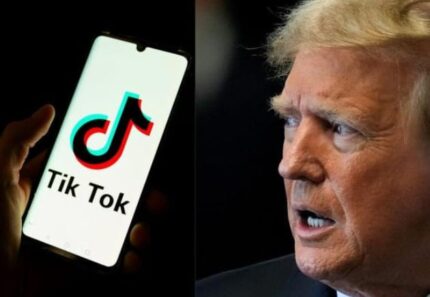Former President Donald Trump has indicated he will “most likely” grant TikTok a 90-day extension from the ban set to take effect on Sunday, just before his inauguration as the 47th U.S. president. Speaking in a phone interview with NBC News, Donald Trump confirmed an official announcement on the matter would likely come on Monday after he assumes office.
The Supreme Court recently upheld a law mandating that TikTok’s China-based parent company, ByteDance, must sell the platform by January 19 or face a nationwide ban. ByteDance, however, has refused to comply, prompting concerns that the app could “go dark” in the U.S. without intervention. Trump justified the potential extension, saying, “The 90-day extension is something that will most likely be done because it’s appropriate. We have to look at it carefully. It’s a very big situation.” He reiterated similar remarks in a separate interview with ABC News, emphasizing his authority over the final decision.
TikTok Warns of Shutdown as White House Calls It a ‘Stunt’
In response to the looming ban, TikTok issued a statement late Friday, accusing the Biden administration of failing to provide clarity and necessary assurances to service providers that help keep the app operational. The company warned that without intervention, it would be forced to cease operations in the U.S. on Sunday.
However, White House press secretary Karine Jean-Pierre dismissed TikTok’s warning as a “stunt,” asserting that the company had no immediate reason to take drastic measures before the new administration took office. “We see no reason for TikTok or other companies to take actions in the next few days before the Donald Trump administration takes office on Monday,” she said, stressing that any enforcement of the law would be handled by Trump’s team. She urged TikTok and other affected businesses to address their concerns with the incoming administration instead.
National Security Concerns and Diplomatic Implications
Donald Trump’s decision comes amid ongoing national security concerns surrounding TikTok’s data privacy practices. U.S. intelligence officials have long warned that the app could be used by the Chinese government to track American federal employees and contractors. TikTok has repeatedly denied these allegations, insisting that user data is securely stored and not accessible by Chinese authorities.
The issue also carries significant diplomatic weight. Donald Trump confirmed he had discussed TikTok with Chinese President Xi Jinping, among other matters, during recent talks. Additionally, TikTok CEO Shou Zi Chew is expected to attend Trump’s inauguration on Monday, a move that signals ongoing negotiations between the company and the new administration. The 90-day extension, if granted, would provide TikTok and ByteDance additional time to seek a resolution, potentially averting an immediate shutdown of the widely popular social media platform.
China Condemns U.S. Actions, Vows Retaliation
The Chinese embassy in Washington, D.C., has strongly criticized the United States over its recent moves to restrict TikTok, accusing it of “unfairly suppressing” the popular short-video platform. In a statement issued on Friday, a spokesperson for the embassy warned that China would take “all necessary measures to resolutely safeguard its legitimate rights and interests.” The condemnation comes as the U.S. government prepares to enforce a law passed in April, which mandates TikTok’s removal from app stores and web-hosting services unless its Chinese parent company, ByteDance, divests its ownership.
The platform, which claims to have 170 million users in the U.S., has become a major force in social media, particularly among younger audiences. It has also emerged as a key tool for political campaigns, including in the 2024 U.S. presidential race. While former President Donald Trump once supported a TikTok ban, he has since softened his stance, acknowledging the platform’s influence and highlighting the billions of views his videos garnered during his last campaign. The Biden administration, however, remains firm in its national security concerns, arguing that TikTok’s ties to China pose a risk to American data privacy.
Impact on Users and the Potential Future of TikTok in the U.S.
For many TikTok users, particularly content creators and small businesses, the impending ban represents a significant financial and creative setback. Many influencers and entrepreneurs who rely on the app for income are voicing concerns about the uncertain future. “Indirectly, TikTok was the majority of my income because all brands want their stuff to be promoted on the app,” fashion designer and artist Nicole Bloomgarden told the BBC, emphasizing the potential disruption the ban would cause to her livelihood.
If the U.S. ban proceeds, TikTok’s fate may mirror what happened in India in 2020. Following a deadly border clash with China, the Indian government banned TikTok and several other Chinese-owned apps. Within two weeks, India’s 200 million TikTok users were locked out, as local internet providers blocked access and major app stores removed the platform. Unlike in India, where TikTok did not legally contest the ban, the company has signaled its intent to fight the U.S. order in court.
Meanwhile, competitors such as Instagram Reels and YouTube Shorts are poised to capitalize on the void, much like Meta did in India. With tensions escalating, the future of TikTok in the U.S. remains highly uncertain, while China prepares for potential countermeasures.














